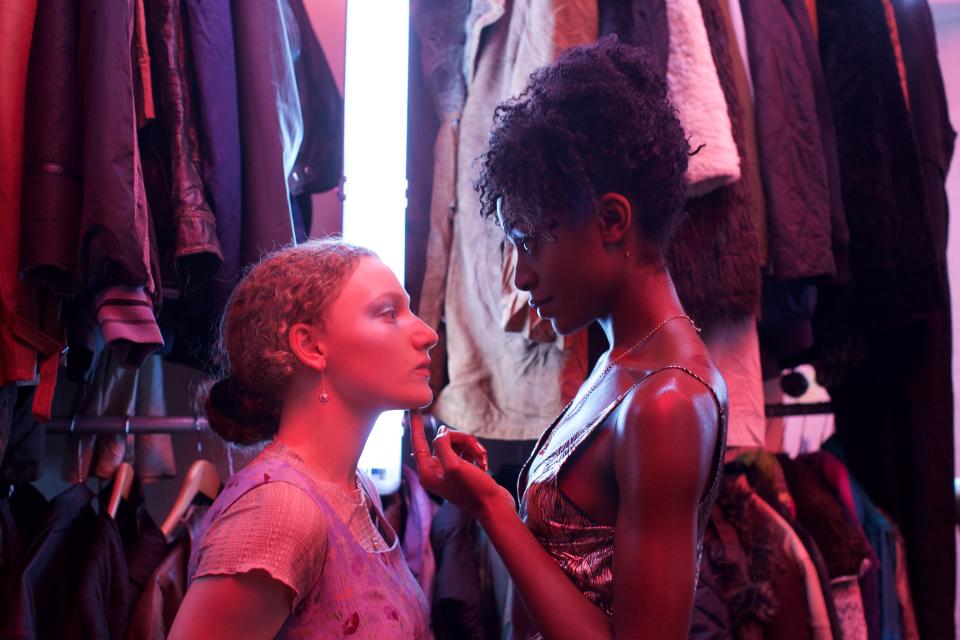‘Kiss Me First’ Review: Netflix’s Cyber-Thriller Is a Bleak and Toothless Mess of Virtual Reality

“Kiss Me First,” like its teenage protagonist, is confused and immature. The Netflix series has the raw materials for what could be a promising tale, but its storytelling has not yet found its voice. Instead, it appears to be mimicking a number of different genres – cyber-thriller, mystery, coming-of-age, and romance – yet doesn’t know how to blend or develop them.
The brief, six-part British series is very loosely inspired by the novel by Lottie Moggach, and how it botches the adaptation will be addressed later. Teenager Laila (Tallulah Haddon) retreats into the virtual world of Azana and needs it more than ever now that her sick mum has died. She encounters a mysterious group of misfits, including a young woman named Tess (Simona Brown), whom she befriends in the real world.
Read More:The Best TV Shows to Binge and Where to Watch Them – June 2018
What follows is a meandering, flailing sequence of events in which Laila muddles through life after mum by acquiring a menial job (to pay for more Azana time) and a boarder named Jonty (Matthew Aubrey) who’s a rather bad aspiring actor. Her jaunts into the VR world, however, lead her to suspect that something bigger and more sinister is afoot, and somehow this is connected to Tess.
Their connection is instant, or so we’re told by their lingering glances, Tess seeking out Laila, and the sacrifices that Laila makes for Tess. As is so much in this series, there’s a shorthand for storytelling. They’re going through all the proper motions for romance, but sadly, there’s never any real interaction that sells their chemistry. This is no fault of the actresses though. Both Haddon and Brown make the most of the spare, unremarkable dialogue given to them. Alas, it would’ve been nice to actually feel the girls’ friendship and budding connection instead of having it be assumed after one night of dance club debauchery.

Characterizations are similarly lazy. Tess is a troubled manic pixie dream girl who is most certainly bipolar (how many times must we hear about the lithium?), but that doesn’t seem to be vital; just one more thing to pile onto the story. Jonty is utterly ridiculous and serves no other purpose than to act foolish – whether it’s for laughs or to be used for nefarious schemes. Hell, the villain even sounds like a finger-steepling bad dude when he talks on the phone.
As for the mystery itself, Laila rarely uncovers information through ingenuity or deduction. Instead, she snoops, and then independently information delivers itself straight to her. It’s as if the show doesn’t trust its viewers to follow along and be engaged with the mystery.
While the storytelling might need some finesse, some of the subject matter tied directly to the mystery is mature enough to warrant a content warning on the level of “13 Reasons Why.” Sex, abuse, suicidal thoughts, and death are all on the menu, which makes for an incredibly bleak outlook. It’s not terribly surprising since “Skins” creator Bryan Elsley is also behind this series, but it lacks the insight and authenticity of “Skins.”
Read More:TV Critics Pick the Best Overlooked New Shows of 2018 So Far
All those failings aside, the most curious elements in this series counter the entire ethos of the cyber-thriller. For one, the pacing is so lethargic, it feels that it should be a contemplative, character-driven piece. By the time Laila starts to mobilize in earnest to defeat the bad guy, more than half the series has passed.
And then there’s the cyber element: the VR world encountered in Azana and its connected realms. The show ponies up money for entire CGI scenes, but even if you ignore the Uncanny Valley of it all, it’s boring as hell in there. VR worlds in pop culture usually offer up some sort of tantalizing or flashy wish fulfillment: eternal life or fantasy dating in “Black Mirror,” escapist games and alter egos in “Ready Player One,” reuniting with a loved one who’s passed in NBC’s “Reverie.” But while there’s a nod to some of the gamesmanship and warfare in VR, that’s quickly shunted aside for a gorgeous but ultimately uninspiring landscape. Those sequences are such a drag that one’s life has to be absolutely wretched to want to go there. That may be the point for some characters, but it’s certainly not fun for viewers.

To make matters worse, Azana doesn’t appear to be necessary for the narrative at all and it shows. Maybe that’s because Moggach’s book focuses more on the cyber identities that we create for ourselves to cover up the nasty goings-on than the more visually friendly VR world created for the show. The biggest departure, however, is that Laila in the book is a participant in the shady scheme at the heart of the mystery, and therefore has a complex and fascinating morality for a protagonist. Here, the bad guy is using and manipulating her, and thus Laila becomes the unequivocal hero. This makes the story stale and toothless.
“Kiss Me First” has the kernel of something intriguing here as it posits a different type of wish fulfillment but never takes the time to explore all of its possibilities. The show’s adherence to tired storytelling tropes hamstrings it from becoming more profound, exciting or original. Instead, it somehow manages to be both sleepy and bleak, which only drives viewers to seek out a different reality elsewhere.
Grade: C+
”Kiss Me First” is currently available to stream on Netflix.
Launch Gallery: The Best TV Posters of 2018, So Far
Related stories
'GLOW' Season 2 Soundtrack: All the '80s Tracks from the Netflix Show's Second Round
'GLOW' Review: Season 2 Is a Smart, Nonstop Good Time That Breaks New Ground on Netflix

